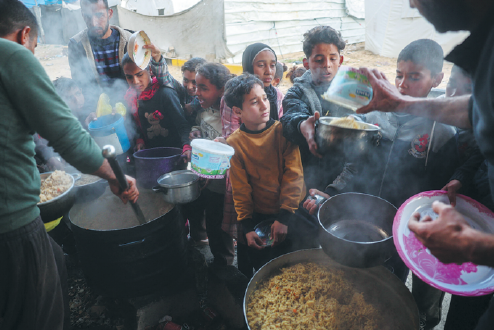'Hell to pay' if hostages not freed: Trump
US holds direct talks with Hamas amid deepening humanitarian crisis in Gaza

US President Donald Trump on Wednesday warned Hamas of "hell to pay" if all remaining hostages held in Gaza are not released.
The United States meanwhile confirmed unprecedented direct talks with the Palestinian militant group, which it proscribes as a "terrorist" organization, focused on US hostages in Gaza.
White House press secretary Karoline Leavitt declined to provide details on the substance of talks, but said Trump has authorized his envoys to "talk to anyone".
Trump appealed to Hamas to release all hostages — both dead and alive — calling the group "sick and twisted" for keeping the corpses of some of the hostages.
"This is your last warning! For the leadership, now is the time to leave Gaza while you still have a chance," he wrote on his Truth Social platform after meeting freed hostages.
Trump also warned of repercussions for Gaza as a whole, where virtually the entire population has been displaced by Israel's relentless military campaign in response to Hamas' Oct 7, 2023, attack.
"To the people of Gaza: A beautiful future awaits, but not if you hold hostages," he said. "Make a smart decision. Release the hostages now, or there will be hell to pay later!"
In addition, Trump said he was "sending Israel everything it needs to finish the job" as his administration expedites billions of dollars in weapons.
In response, Hamas said on Thursday that Trump's threats constituted support for Israeli Prime Minister Benjamin Netanyahu to back out of the Gaza cease-fire and intensify the siege of Gazans.
In a text message to Reuters, Hamas spokesman Abdel-Latif Al-Qanoua said, "The best track to release the remaining Israeli prisoners is by the occupation going into the second phase and compelling it to adhere to the agreement signed under the sponsorship of mediators."
The first phase of the cease-fire agreement ended over the weekend after six weeks of relative calm that included exchanges of Israeli hostages for Palestinian prisoners held in Israeli jails.
The deal calls for the remaining hostages to be freed in the second phase, during which final plans would be negotiated for an end to the conflict.
Meanwhile, Netanyahu's office issued a statement saying Israel has expressed to the US its position regarding direct talks with Hamas, without elaborating.
Rasha Al Joundy, a senior researcher at the Dubai Public Policy Research Centre in the United Arab Emirates, told China Daily that Trump "has a strong position on what he wants" to end the Gaza crisis.
"This means that all parties will be pressured somehow to cooperate, and this includes Israel because it is the far-right government that is making decisions and everyone else is just trying to contain the implications," she said.
Everyone in the Middle East, including Israel, "is nervous and waiting for the scenario Trump adopts for the next Gaza phase", she added.
"Israel wants to sell (out) the agreement it had with Hamas twice by refusing to engage in the next phase and insisting on prolonging the current phase of the agreement. Freeing the hostages despite stopping the aid to Gaza … means no peace talks."
For Palestinians, Trump's threats appeared to have been overshadowed by the dire humanitarian crises unfolding.
The Gaza Strip is experiencing the negative effects of Netanyahu's order to impose a total blockade on all goods entering Gaza until Hamas accepts the US proposal to extend the first phase of the cease-fire deal.
Palestinians say the blockade could lead to starvation among the 2.3 million people living in the enclave's ruins.
Increasing prices
Nebal Farsakh, spokeswoman for the Palestine Red Crescent Society, told China Daily that the situation in Gaza is deteriorating, severely affecting the market where the prices of essential items are rapidly increasing.
"We are expecting the situation to become even worse if the blocking of aid continues as the situation was dire even before the blocking of aid," Farsakh said.
In a joint statement on Wednesday, the foreign ministers of France, Germany and the United Kingdom expressed "deep concern" about Israel's decision to halt aid into the Gaza Strip.
"We call on the government of Israel to abide by its international obligations to ensure full, rapid, safe and unhindered provision of humanitarian assistance to the population in Gaza," the statement said.
In response, the Israeli Foreign Ministry wrote on X, "Hamas is taking over the aid that enters Gaza and is exploiting it in order to rebuild its war machine.
"The aid trucks have become an economic engine for Hamas. Half of Hamas' budget in Gaza comes from these trucks.
"Aid that goes to Hamas is not humanitarian. Enabling the enemy to resupply itself so it can regroup and attack you again is not humanitarian — it is suicidal and will not be allowed," it added.
Meanwhile, the United Nations food agency, the World Food Programme, said on Wednesday that it has less than two weeks' worth of food supplies in the Gaza Strip as a result of Israeli restrictions.
Agencies contributed to this story.

Today's Top News
- Consumption to play bigger part in growth
- Opposition moves to impeach Lai
- Character, phrase of year underscore tech aspirations
- Macao thrives as collaboration deepens
- China to continue anti-dumping duties on EPDM imports
- Trump says war with Venezuela remains possible -- NBC News






























